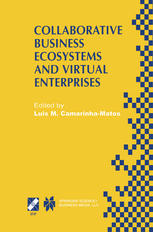

Most ebook files are in PDF format, so you can easily read them using various software such as Foxit Reader or directly on the Google Chrome browser.
Some ebook files are released by publishers in other formats such as .awz, .mobi, .epub, .fb2, etc. You may need to install specific software to read these formats on mobile/PC, such as Calibre.
Please read the tutorial at this link: https://ebookbell.com/faq
We offer FREE conversion to the popular formats you request; however, this may take some time. Therefore, right after payment, please email us, and we will try to provide the service as quickly as possible.
For some exceptional file formats or broken links (if any), please refrain from opening any disputes. Instead, email us first, and we will try to assist within a maximum of 6 hours.
EbookBell Team

4.7
106 reviewsTowards collaborative business ecosystems Last decade was fertile in the emerging of new collaboration mechanisms and forms of dynamic virtual organizations, leading to the concept of dynamic business ecosystem, which is supported (or induced ?) by the progress of the ubiquitous I pervasive computing and networking. The new technologies, collaborative business models, and organizational forms supported by networking tools "invade" all traditional businesses and organizations what requires thinking in terms of whole systems, i. e. seeing each business as part of a wider economic ecosystem and environment. It is also becoming evident that the agile formation of very dynamic virtual organizations depends on the existence of a proper longer-term "embedding" or "nesting" environment (e. g. regional industry cluster), in order to guarantee certain basic requirements such as trust building ("Trusting your partner" is a gradual and long process); common interoperability, ontology, and distributed collaboration infrastructures; agreed business practices (requiring substantial engineering Ire-engineering efforts); a sense of community ("we vs. the others"), and some sense of stability (when is a dynamic state or a stationary state useful). The more frequent situation is the case in which this "nesting" environment is formed by organizations located in a common region, although geography is not a major facet when cooperation is supported by computer networks.